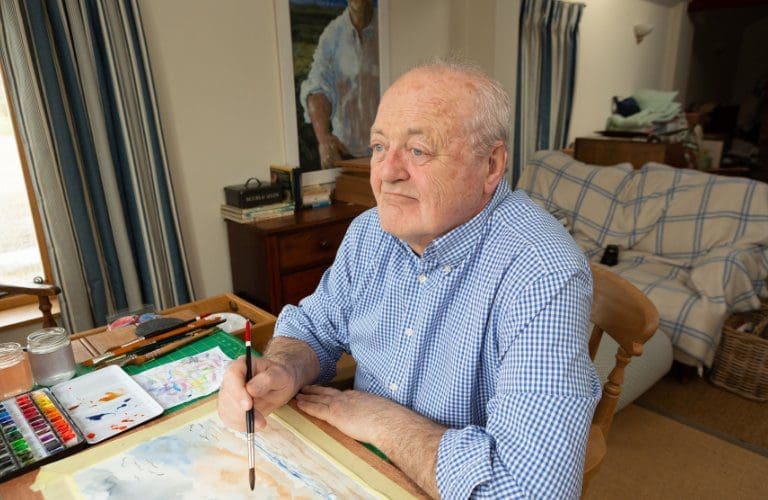
Maq’s story
Maq was diagnosed with frontotemporal dementia in 2010 at the age of 54. Here he reflects on how the condition affects his day-to-day life.
The most common symptoms of dementia include difficulties with remembering, thinking and speaking, which get worse over time. However, there are many other possible symptoms, and everyone has their own unique experience of the condition.
Our dementia specialist Admiral Nurses explain the signs and symptoms to be aware of.
Dementia is an umbrella term for a range of conditions that affect the brain. There are many different types, subtypes and causes. It is a progressive condition, which means the symptoms always get worse over time.
There is a wide range of possible signs and symptoms of dementia. People may have some or all of them. The common symptoms include memory problems, changes in cognitive ability (thinking, decision-making and problem-solving) and difficulties with communication. Changes in personality and behaviour are also common in some forms of dementia.
The symptoms vary depending on which type of dementia a person has and what stage they are at – early, middle or late.
Please be aware that many dementia symptoms can also be signs of other physical or mental health conditions, for example thyroid problems, menopause, vitamin B12 deficiency, depression, anxiety, work stress or relationship problems. This means that having symptoms of dementia does not mean you definitely have the condition.
However, if you or someone you know are experiencing signs and symptoms of dementia, it is important to see a GP to establish what may be causing them.
People with dementia may experience:
People with dementia may have changes in cognition, such as:
People with dementia may experience problems with communicating and understanding, including:
Changes in behaviour and personality are more common in people with some forms of dementia. You may notice the person:
In the early stages of dementia, people typically start to experience symptoms that affect their everyday living, including:
The person with early symptoms of dementia may notice the signs themselves, or family, friends and colleagues may spot them first.
Memory problems may not be obvious in the early stages of some types of dementia, like frontotemporal dementia – changes in behaviour and personality may develop first. People with young onset dementia (where symptoms develop before the age of 65) are also less likely to experience memory loss as an early symptom.
Because dementia is progressive, the signs and symptoms will become more obvious and have a bigger impact on the person’s daily life over time. Some people’s dementia progresses rapidly, while for others, the changes happen more slowly over the course of months or years.
In the middle stages of dementia, a person might:
As the symptoms of dementia progress, the person is likely to need more support with daily living, such as washing, dressing, eating and maintaining their home.
In the later stages of dementia, the person’s symptoms will become more pronounced and they are likely to need support with everything they do. A person with advanced dementia is likely to:
Many people with dementia will eventually need additional care from a home carer or in a residential care home.
The progression of dementia can be unpredictable. A person’s symptoms may remain stable for some time and then suddenly worsen, or they may progress gradually.
It is important not to assume that a sudden change in symptoms is a result of the person’s dementia. There may be an underlying medical condition such as an infection or delirium (a state of sudden, intense confusion that is often linked to illness). If there is a noticeable change in the person’s symptoms – such as increasing distress, confusion, hallucinations or frequent falls – it is important to seek advice from their GP.
Common signs and symptoms of Alzheimer’s disease include:
Vascular dementia is caused by problems with blood flow to the brain, for example as a result of a stroke or ‘mini strokes’ known as transient ischaemic attacks (TIAs). The signs and symptoms depend on which area of the brain has been affected. Common symptoms include:
There are two main types of frontotemporal dementia: behavioural variant frontotemporal dementia (bvFTD) and primary progressive aphasia (PPA).
The initial symptoms of bvFTD may include:
The initial symptoms of PPA include:
The symptoms of Lewy body dementia include:
Memory is often less affected than in other types of dementia.
Mixed dementia refers to a person having more than one type of dementia at the same time. They will have symptoms of each type, which may be more noticeable and appear to progress more rapidly.
Huntington’s disease is a genetic condition that primarily affects a person’s movement. It is not in itself dementia, but the damage it causes to the brain may lead to dementia. You can find out more about the physical, mental and cognitive symptoms in our information on Huntington’s disease.
Parkinson’s primarily affects people’s movement, with symptoms including slow movement, tremors, rigidity and balance problems. About one-third of people with Parkinson’s will go on to develop dementia, known as ‘Parkinson’s with dementia’, particularly in the later stages. Please see our information on Parkinson’s and Parkinson’s with dementia.
There are two main types of alcohol-related brain damage: Wernicke’s encephalopathy and Korsakoff’s syndrome.
Alcohol-related brain damage is often reversible if the person stops drinking alcohol and receives thiamine (vitamin B1) supplementation. However, it can develop into dementia, which is known as ‘alcoholic dementia’. The symptoms of alcoholic dementia include:
Dementia symptoms are generally the same in men and women. However, women are more likely to develop Alzheimer’s disease than men, which has symptoms like memory loss, confusion and loss of recognition of people, places and objects.
Men are slightly more likely than women to develop vascular, frontotemporal and Lewy body dementia, so may show the symptoms most commonly associated with these types, such as difficulties with communication, attention and decision-making; and changes in behaviour and personality.
While dementia itself is not a normal part of ageing, the risk of developing dementia increases with age. In general, the symptoms of dementia are similar in both younger and older people, but they may seem more pronounced in older people.
People with young onset dementia are more likely to have a rarer form of dementia with less typical symptoms. This may mean that their dementia symptoms are missed or misdiagnosed.
Several conditions cause symptoms similar to those of dementia. These include:

Maq was diagnosed with frontotemporal dementia in 2010 at the age of 54. Here he reflects on how the condition affects his day-to-day life.

Julie writes about how her Admiral Nurse Rachel helped her understand the complexities of the health and social system – and her husband's diagnosis - when no one else could.

George was diagnosed with mixed dementia in 2014 at the age of 62 and has spent much of the last eight years meeting people who live with the condition and campaigning for better support and services.
To speak to a dementia specialist Admiral Nurse about vascular dementia or any other aspect of dementia, please contact our free Helpline on 0800 888 6678 (Monday-Friday 9am-9pm; Saturday, Sunday and bank holidays 9am-5pm, every day except 25th December.
Alternatively, you can book a free, 45-minute phone or video appointment with an Admiral Nurse.
Difficulty remembering names is a common symptom of dementia, particularly as it progresses. This may be the result of memory loss, difficulties with communication (eg word-finding) or an impaired ability to recognise faces. However, occasionally forgetting names is not necessarily a sign of dementia and can be due to concentration issues, for example.
Most people with dementia will have problems with memory. In some types of dementia, such as Alzheimer’s disease, memory loss is an early symptom – particularly short-term memory loss. In other forms, such as frontotemporal dementia, the person may not have obvious memory problems at first but is likely to develop them as their condition progresses.
Many people have occasional lapses in memory for a variety of reasons, so do not assume that forgetfulness is necessarily a sign of dementia. However, if you have concerns that your memory is becoming significantly worse, please speak to a GP.
Asking the same questions again and again, telling people the same story multiple times or repeating words are common signs of dementia and may be caused by problems with memory, concentration or communication. As with other symptoms, this is not a definitive sign of dementia, but please see a GP if you are worried.
Some forms of dementia can cause changes in a person’s behaviour and difficulties in how they control their impulses, emotions and actions. This may lead to challenging behaviour, such as hitting, kicking, scratching or pushing.
Aggression may also be a sign that the person with dementia feels frightened, threatened, confused or overwhelmed. Trying to identify and address the cause of their distress may help to ease their agitation.
Be aware of your personal safety if someone close to you is showing aggression: read our advice on keeping safe when you care for someone with dementia.
Aggression is not always a sign of dementia. Some people naturally have a shorter temper, or may become more irritable if they are under stress, for example. However, if someone is behaving aggressively it is important that they seek help, initially from their GP, to discuss ways to manage their aggression – for example through talking therapy.